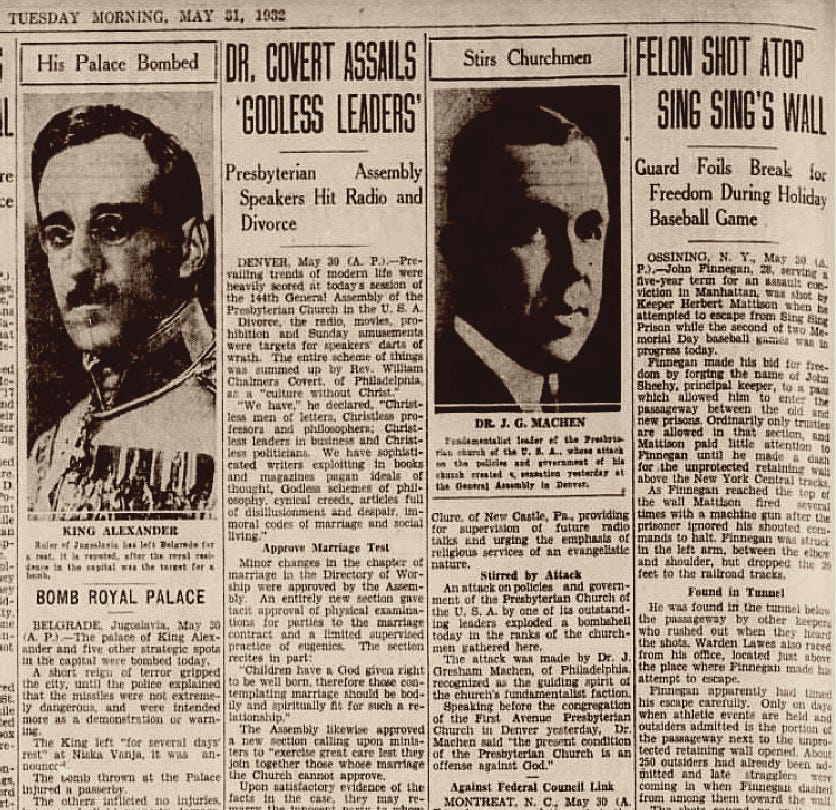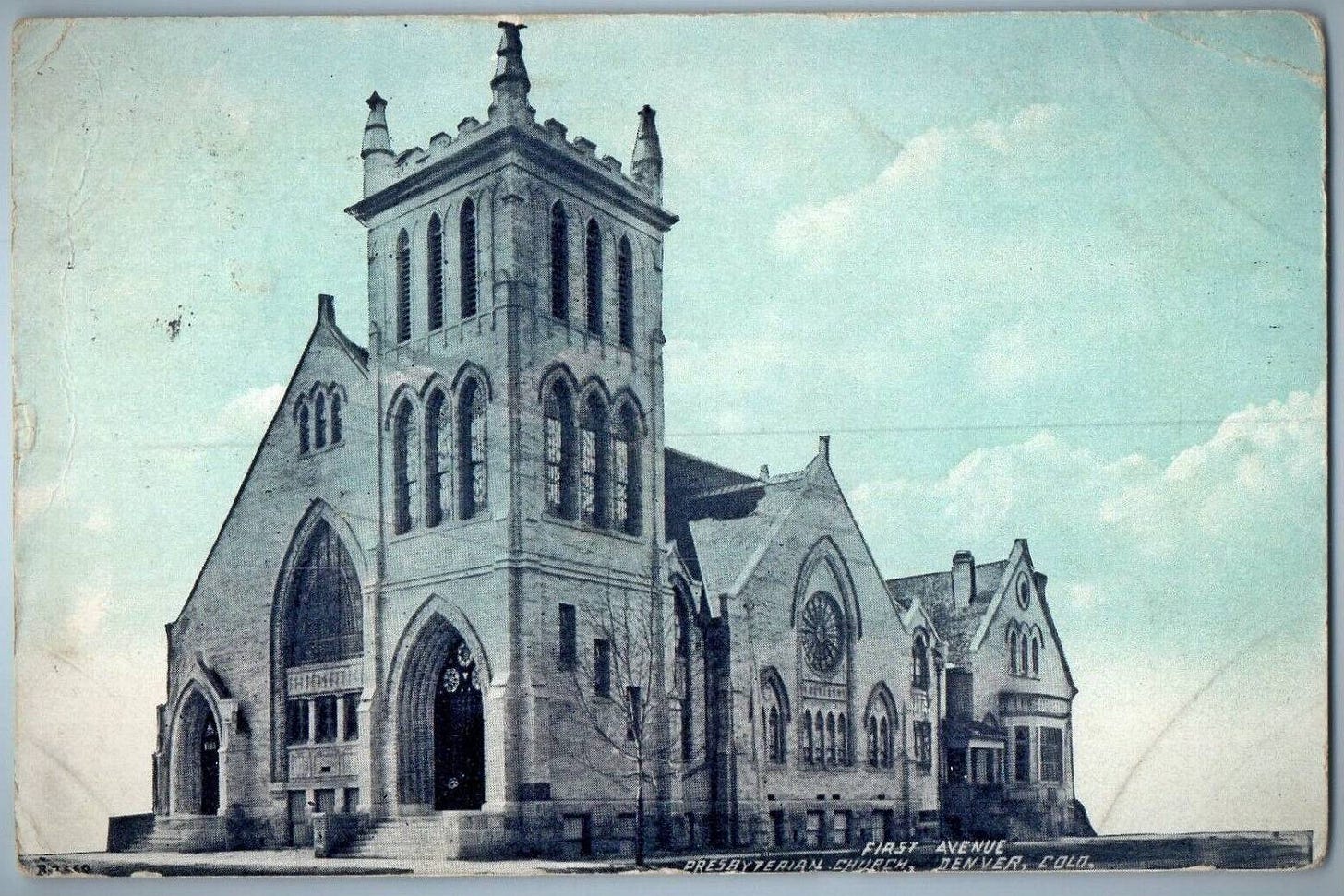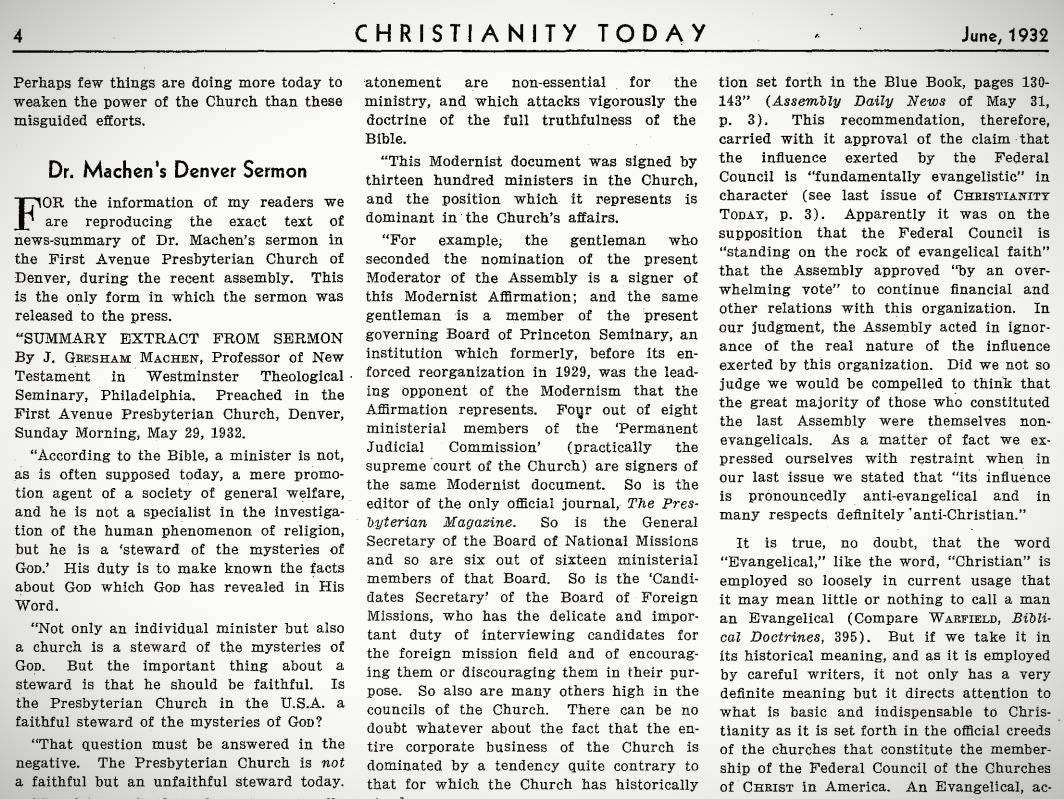“In the sphere of religion, as in other spheres, the things about which men are agreed are apt to be the things that are least worth holding; the really important things are the things about which men will fight.”
These words ended the opening paragraph of J. Gresham Machen’s 1923 classic Christianity and Liberalism. Fighting may be defensive or it may involve attack. When today’s news media wish to portray political rhetoric or reactions in a negative light, they often say that one side or group (nearly always the conservative side) has pounced on some person, thing, or issue. An Associated Press story from 1932 shows that neither the shallow sensationalizing of “religious” news nor the pejorative use of the term “fundamentalist” is anything new. They may as well have said MACHEN POUNCES:
DENVER, May 30, (A.P.) ... An attack on policies and government of the Presbyterian Church of the U.S.A. by one of its outstanding leaders exploded a bombshell today in the ranks of the churchmen gathered here.
The attack was made by Dr. J. Gresham Machen of Philadelphia, recognized as the guiding spirit of the church's fundamentalist faction.
Speaking before the congregation of First Avenue Presbyterian Church in Denver yesterday, Dr. Machen said "the present condition of the Presbyterian Church is an offense against God."
(Philadelphia Inquirer, Tues. May 31. 1932)
There’s little context to show why Machen felt put upon by a decade of liberalizing declension1 in the northern mainline church. A casual reader might have assumed Machen was just some angry crank. That a sermon preached in the run-up to a presbyterian general assembly could make national news shows how much things have changed in the USA—the mainline still seemed to run the “Christian” nation of America in 1932.
Well, Machen did feel put upon and so “put it on” the moderate-liberal elites who ran the Presbyterian Church in the U.S.A. You may, like us, question the advisability of (church) political sermons on the Lord’s Day, but times were different. Apparently, such things were more usual 90-100 years ago. There were “really important things” about which men were most definitely fighting. Here’s how the local paper gleefully covered the pugilistic pastor:
The chief event of Sunday, however, was the appearance of Dr. Machen in the pulpit of the First Avenue Presbyterian Church of Denver, whose pastor is Dr. Thomas Murray, Dr. Machen preached two powerful sermons. He was quoted in Monday morning's Rocky Mountain News under the following headlines: "Presbyterian Heads Flayed by Churchman ... Dr. J. Gresham Machen Fiercely Assails Attitude of Modernists ... Directs Suspicion ... Asserts Unfaithfulness Is Being Concealed in Reign of Secrecy ... Bitter Attack on the Presbyterian Church ... " One of the paragraphs of the news Item read: "Scarcely any branch of the church's administrative bodies escaped the withering fire of his criticism. In harsh language he assailed the actions of men high in the Councils of the Church." The whole effect of the manner in which this story was handled was to make it appear that Dr. Machen's message was other in spirit and content than it was. It was not bitter-unless the truth is bitter. It certainly was not harsh, but it was unpleasant to many because it brought out into public view the very dangerous condition of the Church, which many people want to ignore, ostrich-like. His words were a needful and salutary purgative. In order that the readers of CHRISTIANITY TODAY may know the exact form in which quotations of Dr. Machen's sermon were handed to the press, the text is reproduced on Page 4. It is an undeniable fact that, on Monday morning as newsboys at the door of the Auditorium shouted out "Dr. Machen makes bitter attack on Presbyterian Church," a number of tempers went up to the boiling point.2
Major ecclesial figures sometimes called press conferences in 1932…and reporters even came. Sermon summaries were provided to the papers, and we have a friendlier and fuller picture from a publication with which Machen was associated—the “old” Christianity Today (as referenced in the above quote):
Dr. Machen's Denver Sermon
FOR the information of my readers we are reproducing the exact text of news-summary of Dr. Machen's sermon in the First Avenue Presbyterian Church of Denver, during the recent assembly. This is the only form in which the sermon was released to the press.
SUMMARY EXTRACT FROM SERMON By J. GRESHAM MACHEN,
Professor of New Testament in Westminster Theological Seminary, Philadelphia.Preached in the First Avenue Presbyterian Church, Denver, Sunday Morning, May 29, 1932.
According to the Bible, a minister is not, as is often supposed today, a mere promotion agent of a society of general welfare, and he is not a specialist in the investigation of the human phenomenon of religion, but he is a “steward of the mysteries of God.” His duty is to make known the facts about God which God has revealed in His Word.
Not only an individual minister but also a church is a steward of the mysteries of God. But the important thing about a steward is that he should be faithful. Is the Presbyterian Church in the U.S.A. a faithful steward of the mysteries of GOD?That question must be answered in the negative. The Presbyterian Church is not a faithful but an unfaithful steward today.
Suspicion of that fact is naturally aroused by the secrecy and the discouragement of fair and open discussion which prevails in the councils of the Church. A treasurer who is afraid to let his books be seen is under suspicion. So also is a Church that checks investigation of its doctrinal witness. A secret trial of an evangelical minister has recently been conducted in the Synod of Pennsylvania. Such secrecy offends against the most elementary principles of liberty and fair play, and places the Presbyterian Church on a distinctly lower ethical plane than that which prevails in the world at large. A similar temper prevails in the administrative procedure of the Church. The really serious questions are covered up by a mass of verbiage, and the deep-seated unfaithfulness of the Church is being concealed.
But gradually the truth is coming to light. It is becoming increasingly plain that the Presbyterian Church is dominated by a tendency which is hostile or indifferent to the deep things of the Christian religion.
That tendency is represented by the Modernist document commonly called the “Auburn Affirmation” which declares that the virgin birth, the bodily resurrection, the miracles of Christ, the substitutionary atonement are non-essential for the ministry, and which attacks vigorously the doctrine of the full truthfulness of the Bible.This Modernist document was signed by thirteen hundred ministers in the Church, and the position which it represents is dominant in the Church's affairs.
For example; the gentleman who seconded the nomination of the present Moderator of the Assembly is a signer of this Modernist Affirmation; and the same gentleman is a member of the present governing Board of Princeton Seminary, an institution which formerly, before its enforced reorganization in 1929, was the leading opponent of the Modernism that the Affirmation represents. Four out of eight ministerial members of the “Permanent Judicial Commission” (practically the supreme court of the Church) are signers of the same Modernist document. So is the editor of the only official journal, The Presbyterian Magazine. So is the General Secretary of the Board of National Missions and so are six out of sixteen ministerial members of that Board. So is the “Candidates Secretary” of the Board of Foreign Missions, who has the delicate and important duty of interviewing candidates for the foreign mission field and of encouraging them or discouraging them in their purpose. So also are many others high in the councils of the Church, There can be no doubt whatever about the fact that the entire corporate business of the Church is dominated by a tendency quite contrary to that for which the Church has historically stood.
What shall be done under such circumstances by Bible-believing Christians in the Church? In the first place, they should face the facts and lay the facts before God in prayer. They should cease repeating in parrot·like fashion the untruth that “the Presbyterian Church is essentially sound.” In the second place, they should insist on faithful stewardship. If the present Boards and agencies cannot be radically reformed, new Boards and agencies should be organized to propagate faithfully the gospel of the Lord Jesus Christ. The present condition of the Presbyterian Church is an offence against God. But the Spirit of God is all-powerful, and the darkest hour sometimes just precedes the dawn.
Machen was direct, forthright…salty, even. This is obviously not the (summarized) “sermon” you’d want to hear on a Lord’s Day morning if that was all there was to it, but Machen was in a fight. Previous generations of churchmen had failed to prevent the northern church from coming to this pass in the early 1930s. That Machen felt the need to “attack” on the Lord’s Day in 1932 is a solemn reminder to remain vigilant. The peace and purity of the church demand it.
PARTING WORD—More entertaining prose from Christianity Today’s assembly commentary:
While out-voted at all points at the Denver Assembly, the "Fundamentalists," so-called, have reason to be encouraged as they face the future. Bad as was the Denver Assem: bly from their point of view, it was not as bad as was the Pittsburgh Assembly. They had what was lacking at Pittsburgh, viz., able and courageous voices to state and plead their cause. The Rocky Mountain News in summing up the Assembly paid them this tribute: “Although they were in the minority on virtually every issue which came to the Assembly floor, it was the Fundamentalist forces which infused color and spirit into the proceedings. They fought vigorously for abolition of the General Council, which they branded as autocracy, and for the severance of all relations with the Federal Council of Churches. But the beautifully co-ordinated church machine was too powerful for this wing and it was defeated in every skirmish.” Not only were the "fundamentalists" very much alive at Denver but they had a large measure of success in their attempt to secure the severance of relations with the Federal Council. In order to keep the Assembly from voting to sever relation with the Federal Council, the friends of the latter were compelled to admit that it needed reformation from within and to plead that no action be taken pending the coming meeting of the Council in the expectation that desired changes would then be made. Apparently no one had the hardihood to defend that Federal Council as it now is. We will await with interest the outcome of the approaching meeting of the Federal Council. Unless there is genuine reformation from within, severance of all relations with the Federal Council by the next Assembly is by no means unlikely.
The newspaper’s words were rather patronizing. Machen and friends had more on their agenda than merely providing “color and spirit.”
Of course, the decline had started decades earlier in the 19th century. Machen came to the fight in the 1920s when liberalization accelerated and “came out.”





